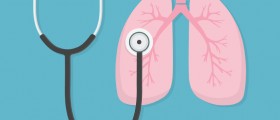
Hyperventilation
Hyperventilation is defined as rapid and deep breathing. Hyperventilation occurs as a symptom of heart and pulmonary diseases, but also as a part of panic and anxiety attacks. Also, there is hyperventilation syndrome that reduces CO2 (carbon dioxide) in the blood, carrying certain symptoms. The immediate consequence of over-breathing is reduced CO2 in the blood that causes narrowing of blood vessels in the skin (pallor) and in the brain, and the poor mobility of tissue.Forms of Hyperventilation
There are at least three forms of hyperventilation:rapid breathing and gasping is seen in very frightened people or during panic attacks. This form of hyperventilation rapidly reduces the level of carbon dioxide in the blood, reinforcing the fear and worsening the symptoms of panic attack. sighing and yawning often happens when someone is disappointed or depressed and is characterized by excessively deep breathing. Staying out of breath is seen when people think about the terrifying things.chronic mild hyperventilation is the wrong breathing habit - a slight increase in speed or depth of breathing is maintained over a long time. The person with this type of hyperventilation is often overly anxious, sometimes feels dizzy and is not able to think normally.Symptoms
Hyperventilation leads to a lack of oxygen in the cells regardless of the faster breathing and increased amount of oxygen in the lungs. This results in the two groups of symptoms: vertigo, dizziness, confusion, lack of air, blurred vision and feeling that everything is unreal rapid heartbeat, arms and legs numbness and insensitivity to touch, palms sweating, and muscle stiffness Since hyperventilation is a physical effort, a person who hyperventilates is feeling the heat in the body, becoming red, sweating and feeling tired and exhausted. During hyperventilation, more frequent use of chest muscles leads to a chest muscle tension, and even tightness and pain in the chest.If too fast or too deep breathing continues, it leads to the second phase of hyperventilation, which is manifested in the following symptoms: severe vertigo, often accompanied with nausea inability to breathe freely strong contraction or acute chest pain short term muscles paralysis in various parts of the body sudden loss of consciousness an increasing feeling of fear that something terrible will happen (heart attack, stroke or dying instantly). Hyperventilation is especially dangerous for athletes and divers who intentionally induce this state by rapid breathing. They have a feeling of greater security under the water due to reduction of carbon dioxide in the blood. They don’t feel the need to breathe fresh air, or feel it when it is too late, because of low gas concentrations in the blood.
Stress or strong unpleasant feelings can cause or worsen hyperventilation.
It is important to know that hyperventilation is not always noticeable, neither to person who hyperventilates nor to others. Hyperventilation may be "hidden" for a long time. In this case, the body gets used to a lower level of carbon dioxide in the blood and there is no symptoms of hyperventilation, but any further, even minimal decrease in carbon dioxide level (eg when sighing or yawning) may be sufficient to lead to symptoms.

















Your thoughts on this
Loading...